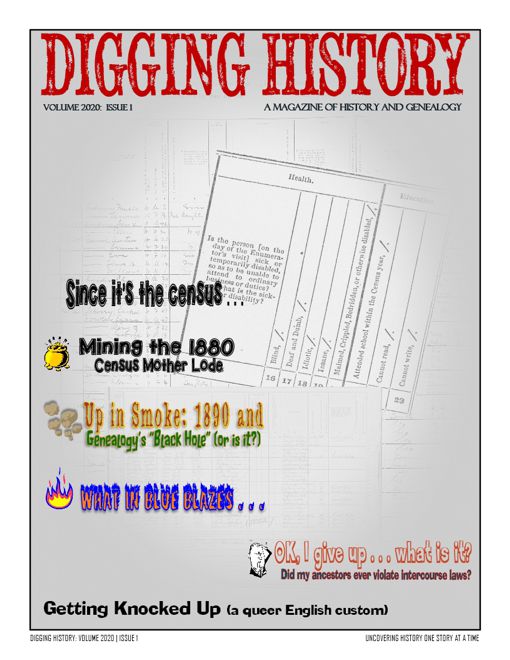Here we are – the first issue of 2020. “Since It’s the Census” is the theme of this issue which includes stories from United States censuses dating back to 1790 up until 1940, the last census available for public scrutiny (1950 is out in 2022!). You’d be amazed at the stories one can glean from census records (and a fair amount of newspaper research, of course).
 I have to say the last several days I’ve felt very much like an overly pregnant woman who is about two weeks overdue. The days seem interminably long as she waits for “that thing to come out” (hence the stork depicting this “somewhat late, yet very special delivery”). I am in fact two weeks overdue from my self-imposed date of January 31 to deliver this issue – and I’m more than ready to “get this thing out”! And, what a big “baby” it is – over 140 pages! The issue is on sale here or purchase a subscription (the best deal) here.
I have to say the last several days I’ve felt very much like an overly pregnant woman who is about two weeks overdue. The days seem interminably long as she waits for “that thing to come out” (hence the stork depicting this “somewhat late, yet very special delivery”). I am in fact two weeks overdue from my self-imposed date of January 31 to deliver this issue – and I’m more than ready to “get this thing out”! And, what a big “baby” it is – over 140 pages! The issue is on sale here or purchase a subscription (the best deal) here.
That being said, I have THOROUGHLY enjoyed researching, writing, editing, etc. this issue – one that I’ve planned to do for quite some time. It just didn’t seem like a better time to do it than the first issue of 2020 as we kick off another census year. As always, I myself have learned TONS and I hope readers will find it informative and entertaining. Please don’t be intimidated by the long articles about the census. I assure you they are FULL of interesting stories.
I was especially amused to have many assumptions I’ve developed over years of genealogical research confirmed – women (and men) fudged their ages, sometimes when an answer couldn’t be provided the enumerator “guessed”. Being a census enumerator was no bed of roses, either, as they struggled to communicate with immigrants suspicious of anything having to do with the government. You’ll especially not want to miss the stories of enumerators who covered their territory on horseback or skis.
This issue of Digging History Magazine is PACKED with stories. Here is a brief summary:
Since It’s a Census Year – What better way to launch 2020 than with an article on this important decennial event. You might be expecting a rather dry recitation of data gathered by the United States government, dating back to the first one conducted in 1790. You would be wrong! I’ve seen the data and accompanying documentation which the government used, and heaven knows only they must understand exactly what it meant!
Census data is vital to genealogical research, yet it’s more than just tick marks (up until the 1850 census), name, age, marital status, occupation and so on. There are literally thousands (more like MILLIONS) of stories to be gleaned – not that I will attempt that feat here, however. This extensive article will look at each decennial census beginning with the first in 1790, through the 1940 census.
Mining the 1880 Census Mother Lode – Family Search refers to the 1880 census as the “mother lode of questions pertaining to physical condition, criminal status, and poverty.” Talk about stories! It took the better part of the 1880s decade to process, but was it ever worth it, all courtesy of the “Supplemental Schedules for Defective, Dependent, and Delinquent Classes” (sometimes referred to simply as the “Defective Schedules”).
Up in Smoke: 1890 and Genealogy’s “Black Hole” (or is it?) – Put on your thinking caps. What event which took place ninety-nine years ago has since become an ever-present challenging obstacle to genealogists? On January 10, 1921 most of the 1890 census went up in smoke – “most” being the operative word. A March 1896 fire had already destroyed a number of these records.
Anyone who has been researching for any length of time likely realizes finding one’s ancestors involves trying many “keys” to unlock hidden caches of records, photos, and so on. Genealogists love census records because they are fairly easy to both access and assess, making the missing 1890 census a discouraging “black hole” for some who haven’t yet tried a little creativity. Why guess (or fudge) when you can do a little extra digging and maybe find a really interesting story! This article is filled with information about this genealogical “black hole” and how to find substitute records utilizing some “research adventure” stories.
The So-Called Calendar Riots and Modern-Day Genealogical Research – Most of us don’t think about time and its measurement in terms of historical context. It’s just time – something we never seem to have enough of in our “gotta-have-it-now” world. Twice each year our internal time clocks (for the majority of Americans) are re-set because we observe what is called “Daylight Savings Time”. We “lose” an hour of sleep in the Spring, only to “gain” it back in the Fall – “spring forward” and “fall back”. World travelers jet around the world every day, losing a day or gaining one by crossing the International Date Line.
We typically grumble about the loss of zzz’s but our bodies (eventually) adapt fairly well. We certainly aren’t particularly exercised over the loss are we? An hour here, or even a day, is not of much concern. But what if it were eleven days? In the mid-eighteenth century a stir rippled throughout England (although less so in its American colonies) as Parliament enacted calendar reforms in 1751. This calendar-altering event affects genealogical research to this day, yet not as dramatically as it seems to have stirred up the rural populace of England at the time – or perhaps we should say as much as political satirists of the time made of the change and (supposed) uproar.
It all seems to involve a bit of revisionist history. In 21st century vernacular let’s call it “fake news”. While researching this article which was to focus on the differences between the Julian and Gregorian calendar systems (sometimes called, respectively, “Old Style” and “New Style”) and how it affects genealogical research, I came across the phrase: “Give us our eleven days!”
Subsequent references to the phrase implied there had been “calendar riots” circa 1752 when England decided to join the rest of continental Europe and adopt the Gregorian calendar which had been around since the 1580s. Attempts to locate the phrase “give us our eleven days” or “give us back our eleven days” in the eighteenth century yielded a big goose egg, although simply using “eleven days” yielded a few references in both England and America around the time of the calendar shift. . . Plus, the story of “setting standard time” in the late nineteenth century (to avoid “fifty-three kinds of time”).
What in the Blue Blazes . . . happened to my ancestor’s (fill-in-the-blank) record? – Family Tree Magazine (May/June 2018) called them “Holes in History” – destructive fires throughout United States history with far-reaching effects on modern-day genealogical research. It might have been the deed to your third great-grandfather’s land in Mississippi, your grandfather’s World War II service record, or the missing 1890 census records. This article will take a look at the stories behind these devastating events and provide tips for finding substitutes.
Here’s something we can all agree on: nineteenth and early twentieth century courthouse fires are the bane of genealogists everywhere. Have you ever wondered why so many courthouse fires occurred in the latter half of the nineteenth century? Would it surprise you to find that many of them were set nefariously? (It shouldn’t.)
Getting Knocked Up (a Queer English Custom) – Once upon a time everyday working folks paid someone to “knock them up”. This, of course, elicits winks and giggles amongst 21st century denizens as “knocked up” often refers to what Merriam-Webster calls “sometimes vulgar: to make pregnant”. There was nothing vulgar intended or implied as this quaint and curious English and Irish custom, begun during the Industrial Revolution and carried forward into the early twentieth century (and beyond for some locales), was an honorable occupation. Before alarm clocks were available and affordable, “getting knocked up” was essential to ensure working men and women avoided fines for arriving late to work.
OK, I Give Up . . . What is It? (Did my ancestors ever violate intercourse(!) laws?) – First, I write an article about getting “knocked up” and now “intercourse laws”. Ahem. Lest anyone think I’m referring to the world’s oldest profession, let me explain. I run across many interesting phrases and curious terms while researching family history for my clients or research for the magazine. One phrase popped up recently and curiosity got the best of me (as it so often does!).
True Grit: Heck Thomas and Sam Sixkiller – This is a companion article to “Did my ancestors ever violate intercourse laws? The short answer — yes, if your ancestor lived near or among Indians they may have at one time or another “violated intercourse laws”. These two legendary “bad-ass” lawmen were kept plenty busy in Indian Territory back in the day.
Family History Tool Box, May I Recommend (Book Reviews) and more!
Sharon Hall, Publisher, Writer, Editor, Graphic Designer of Digging History Magazine
